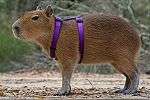Definify.com
Webster 1913 Edition
Harness
Har′ness
(-nĕs)
, Noun.
[OE.
harneis
, harnes
, OF. harneis
, F. harnais
, harnois
; of Celtic origin; cf. Armor. harnez
old iron, armor, W. haiarn
iron, Armor. houarn
, Ir. iarann
, Gael. iarunn
. Cf. Iron
.] 1.
Originally, the complete dress, especially in a military sense, of a man or a horse; hence, in general, armor.
At least we’ll die with
harness
on our back. Shakespeare
2.
The equipment of a draught or carriage horse, for drawing a wagon, coach, chaise, etc.; gear; tackling.
3.
The part of a loom comprising the heddles, with their means of support and motion, by which the threads of the warp are alternately raised and depressed for the passage of the shuttle.
To die in harness
, to die with armor on; hence, colloquially, to die while actively engaged in work or duty.
Har′ness
,Verb.
T.
[
imp. & p. p.
Harnessed
(-nĕst)
; p. pr. & vb. n.
Harnessing
.] [OE.
harneisen
; cf. F. harnacher
, OF. harneschier
.] 1.
To dress in armor; to equip with armor for war, as a horseman; to array.
Harnessed
in rugged steel. Rowe.
A gay dagger,
Harnessed
well and sharp as point of spear. Chaucer.
2.
Fig.: To equip or furnish for defense.
Dr. H. More.
3.
To make ready for draught; to equip with harness, as a horse. Also used figuratively.
Harnessed
to some regular profession. J. C. Shairp.
Harnessed antelope
. (Zool.)
See
– Guib
. Harnessed moth
(Zool.)
, an American bombycid moth (
Arctia phalerata
of Harris), having, on the fore wings, stripes and bands of buff on a black ground.Webster 1828 Edition
Harness
H`ARNESS
, n.1.
Armor; the whole accouterments or equipments of a knight or horseman; originally perhaps defensive armor, but in a more modern and enlarged sense, the furniture of a military man,or offensive, as a casque, cuirass,helmet, girdle, sword,buckler, &c.2.
The furniture of a draught horse, whether for a wagon, coach, gig, chaise, &c., called in some of the American states, tackle or tackling, with which, in its primary sense, it is synonymous.H`ARNESS
,Verb.
T.
Harnessed in rugged steel.
1.
To put on the furniture of a horse for draught. Harness the horses. Jer.46.
2.
To defend; to equip or furnish for defense. 1 Macc.4.Definition 2025
harness
harness
English

Harness on a capybara
Noun
harness (plural harnesses)
- (countable) A restraint or support, especially one consisting of a loop or network of rope or straps.
- (countable) A collection of wires or cables bundled and routed according to their function.
- (dated) The complete dress, especially in a military sense, of a man or a horse; armour in general.
- 1606 William Shakespeare, Macbeth, act V, scene V
- Ring the alarum-bell! Blow, wind! come, wrack!
- At least we'll die with harness on our back.
- 1606 William Shakespeare, Macbeth, act V, scene V
- The part of a loom comprising the heddles, with their means of support and motion, by which the threads of the warp are alternately raised and depressed for the passage of the shuttle.
Derived terms
- harnessed antelope
- harnessed moth
- test harness
Translations
restraint or support
|
|
set of wires
Verb
harness (third-person singular simple present harnesses, present participle harnessing, simple past and past participle harnessed)
- (transitive) To place a harness on something; to tie up or restrain.
- They harnessed the horse to the post.
- 2013 July-August, Henry Petroski, “Geothermal Energy”, in American Scientist, volume 101, number 4:
- Ancient nomads, wishing to ward off the evening chill and enjoy a meal around a campfire, had to collect wood and then spend time and effort coaxing the heat of friction out from between sticks to kindle a flame. With more settled people, animals were harnessed to capstans or caged in treadmills to turn grist into meal.
- (transitive) To capture, control or put to use.
- Imagine what might happen if it were possible to harness solar energy fully.
- 2013 August 16, John Vidal, “Dams endanger ecology of Himalayas”, in The Guardian Weekly, volume 189, number 10, page 8:
- Most of the Himalayan rivers have been relatively untouched by dams near their sources. Now the two great Asian powers, India and China, are rushing to harness them as they cut through some of the world's deepest valleys.
Translations
to place a harness on something
|
to control or put to use
|
See also
-
 harness on Wikipedia.Wikipedia
harness on Wikipedia.Wikipedia
-
 Harness in the 1911 Encyclopædia Britannica.
Harness in the 1911 Encyclopædia Britannica.